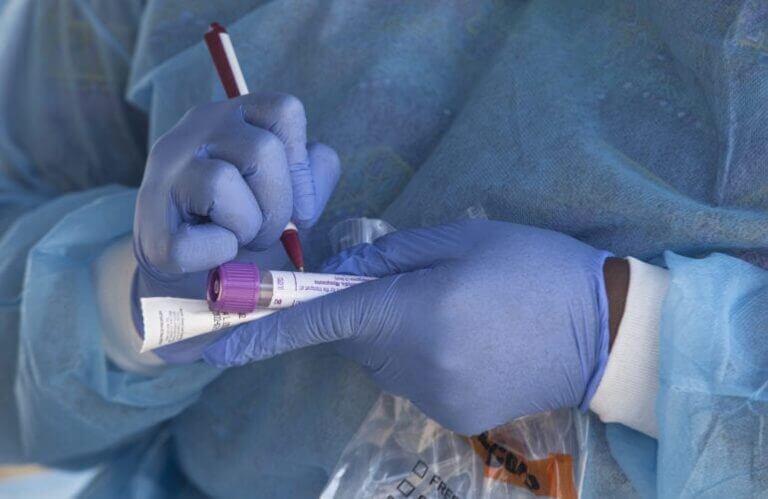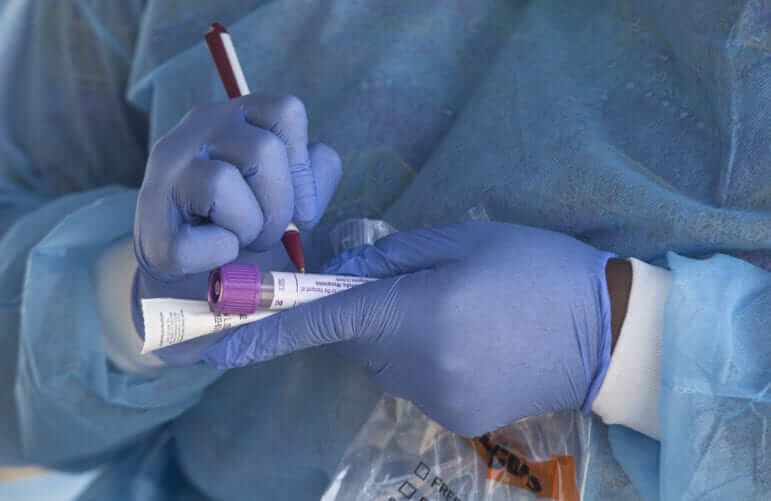

Eric J. Shelton/Mississippi Today
Daphne Webster-Quinn, a nurse practitioner at Mallory Community Health Center, labels collected specimen during COVID-19 testing in Lexington, Miss., Thursday, April 30, 2020.
States across the country are scrambling to finalize plans to distribute thousands of rounds of COVID-19 vaccinations to high-priority patients.
Mississippi has slated vaccination distribution plans into three phases — first priority for front-line health care workers, then long-term care residents. Phase two focuses on high-risk folks such as those with other diseases that make their immune systems more vulnerable, people over the age of 65, essential workers and incarcerated people. General population will be last, likely not expected to see widespread availability until well into next year.
Pfizer-BioNTech announced earlier this month that their initial vaccination trials were 90% effective. Though they were the first to announce, more are expected to follow soon. Drugmaker Moderna announced Monday that its early trials were 94% effective.
No vaccination has been approved by the U.S. Food and Drug Administration yet, but officials anticipate final stage clinical trials, and subsequent emergency-use approval, by year-end for high-priority patients. Widespread availability would likely not be seen until next spring.
Both Pfizer and Moderna’s vaccinations require ultra-cold storage and need freezers that can store more than 1,000 doses at below-zero degrees — Pfizer’s at -94 degrees and Moderna at -4. Meeting the strict storage requirements requires states to plan ahead for not only a new vaccine, but also a new distribution model.
Mississippi health officials say they are working through logistics to ensure the cold-chain storage can be executed, but they also say there’s just not enough money.

UMMC Communications
State health officer Thomas Dobbs at a press conference at UMMC.
“We’ve gotten minimal (federal) financial support for personnel to pull this off,” Dr. Thomas Dobbs, state health officer, told a local town hall last week. “For us to be successful in this vaccination, additional money to pull it off and ongoing National Guard support are the critical elements.”
The National Guard has assisted statewide in early testing efforts, and the state plans to replicate the drive-thru testing models for widespread vaccination distribution to enforce social distancing, according to initial state plans. Extra public health practitioners are needed to help distribute, track, coordinate and promote vaccination efforts. The state health department has been knee-capped by years of budget cuts that have netted flat state cash flow since 2010, severely hindering their ability to fight — much less get in front of — the pandemic.
Dobbs separately expanded on the financial shortfalls, telling the New York Times, “We absolutely do not have enough to pull this off successfully. This is going to be a phenomenal logistical feat, to vaccinate everybody in the country. We absolutely have zero margin for failure. We really have to get this right.”
The Centers for Disease Control and Prevention sent Mississippi $1,511,866 for COVID-19 vaccination preparation as part of $200 million it sent to states — a far cry from the $8 billion requested of Congress by state health departments. Further funding discussions have been caught up in the deadlock in Congress over additional COVID-19 relief funding.
In the official COVID-19 plan sent to the CDC last month, the Mississippi State Department of Health outlined a “closed point of dispensing” plan for first and second phase distribution.
This means MSDH will order the vaccinations for providers across the state, but the shipments will go straight to the clinics where they’ll be distributed. MSDH says it’ll partner with community clinics, colleges and hospitals to reach first-priority populations, but many of these clinics tend to be under-funded and especially strapped for cash this year.
To be able to directly receive the vaccination, clinics will need to have ultra cold freezer capabilities to meet the cold-chain requirements for the Pfizer vaccination storage — with minimum orders of 1,000. That means any distribution points will be responsible for directly receiving large shipments needing to be stored at ultra-cold temperatures for an undetermined amount of time.
MSDH also tells providers that they don’t need to buy special freezers to store the vaccinations.
“Most providers will be unable to store vaccines at this temperature range in their current vaccine storage units. Vaccines that require storage at ultra-cold temperatures will be shipped in containers that can be replenished with dry ice once received. It is not required to purchase ultra-cold vaccine storage units,” reads guidance to providers. But goes on to add that providers themselves, not necessarily facilitated by the health department, must comply with CDC cold-chain requirements.
Following first-priority vaccinations and moving into wider distribution, MSDH will rely on “open point of dispensing.”
“MSDH plans to conduct drive-through vaccination sites to assist with social distancing, as well as expand partnerships with community clinics and pharmacies.”
This method will be set up to mimic the state’s drive-thru COVID-19 testing sites that are currently being held statewide at satellite locations and county health departments. MSDH says this model can manage 500 people per day.
MSDH has allotted the following phases and doses for vaccination distribution:
- Phase 1a: Front-line health care workers, including first responders, pharmacists and the national guard (90,000 doses estimated)
- Phase 1b: long-term and home care residents and staff (55,000 doses)
- Phase 2: those over the age of 65; essential workers, including workers in: education, public health, dentistry, funeral homes, transportation, postal workers, grocery stores, meat packing; homeless people; people with obesity, heart disease, CPOD, diabetes, chronic kidney disease, asthma; and people incarcerated in prisons and jails (2.7 million)
- Phase 3: general public (200,000 doses)
Due to a high rate of people with co-morbidities in Mississippi, the second phase is actually the largest.
The CDC partnered with CVS and Walgreens to handle all vaccinations for long-term care residents who will directly coordinate with the pharmacies for distribution, so MSDH’s role will be limited once the vaccinations have been ordered.
Mississippi Band of Choctaw Indians, who have been devastated by the coronavirus, will coordinate with Indian Health Services, not the state health department, to distribute vaccinations, according to MSDH spokesperson.
University of Mississippi Medical Center recently announced that they are in the beginning stages of local vaccination trials.
The post ‘Zero margin for failure’: With vaccination approval expected soon for high-risk Mississippians, the state doesn’t have enough money to distribute it appeared first on Mississippi Today.
- Legislature, flush with cash, passes budget, completing work for 2024 session - May 3, 2024
- Marshall Ramsey: Sick Burn - May 3, 2024
- On this day in 1850 - May 3, 2024